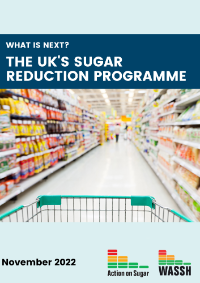UK Sugar Reduction Programme
Our report on the UK’s Sugar Reduction Programme examines why companies have been slow to lower sugar levels in their products and makes recommendations for what action is needed to speed up progress.
Full report: UK's Sugar Reduction Programme - What is Next? [PDF 1,173KB]
One-pager: UK's Sugar Reduction Programme - What is Next? [PDF 94KB]

In 2017, the government introduced a Sugar Reduction Programme, with a 20% reduction in sugar levels in certain key contributors to children’s sugar intake expected by 2020. Unfortunately, by 2019 average sugar levels had reduced by just 3%. When the programme was set up, the government committed to looking at alternative levers if not enough progress was made with the voluntary programme. However, 2 years after the programme finished, the Department of Health and Social Care (DHSC) still hasn’t published the final report or taken further action to reduce sugar levels in processed foods, despite a clear need.
- Excess sugar intake is linked to various health issues: tooth decay, obesity, liver disease, type 2 diabetes and high LDL cholesterol. Oral diseases are the leading reason children aged 5-9 years are admitted to hospital.
- Harvesting sugar beet, the UK’s domestic sugar source, causes irreversible damage to our soils. Using prime agricultural land to make more sugar available for consumption – a crop we need to eat much less of – is contrary to public health needs and environmentally damaging.
- Public Health England’s 2015 analysis showed that reducing average energy intake from sugar to the recommended 5% over the next 15 years would prevent 3,500 deaths and avoid 173,000 dental caries cases annually, whist also saving the NHS £396m each year.
- National Food Strategy analysis showed that if the Sugar Reduction Programme targets were met, UK economic output could grow by £2.2–5.7bn as a result of the larger and healthier workforce.
We are calling on the government to:
- Publish regular, transparent progress reports
- Implement a simple programme with specific, upper limits for all contributing categories of sugar to the diet (including alcohol and infant food), mirroring the government's well-designed salt programme.
- Make the programme mandatory to create a 'level-playing field' for industry: enforce compliance and reward progress by imposing financial penalties for non-compliance, plus explore other fiscal measures, e.g. preferential business rates for companies that produce heathier foods.


